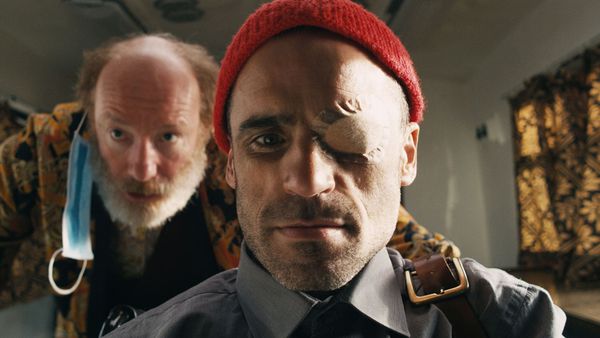Eye For Film >> Movies >> Finky (2019) Film Review
Finky
Reviewed by: Amber Wilkinson

Irish TV writer/director Dathaí Keane smoothly makes the step up to feature films with this dark Irish-language fable about one man's journey into purgatory - both actual and more metaphysical - to a place of, if not redemption, then, at least, acceptance.
Keane sets up an off-kilter mood from the start, as musician Micí Finky Ó Foghlú (Dara Devaney, for whom the filmmaker specifically wrote the part) performs a puppet show of Pinocchio. The idea of puppets will thread through the movie and, though the hall is full of children, there's soon something not quite right about the atmosphere - a sensation that Keane also maintains, making commanding use of red and blue to manipulate the mood.

Finky, it appears, has done something terrible, something that he would prefer not to remember and which leads him on a whim to flee his native Ireland for Glasgow in Scotland. A night of drink and drugs hedonism that has the sort of kinetic energy that recalls Danny Boyle, leads to a wheelchair and an eyepatch. The entire film is a showcase for Devaney - also providing strong support in Arracht - who uses his character's physical limitations as a mirror of his inner frustrations and guilt, his limited movement only adding to the sense of seething emotions beneath the surface.
Keane's characters become increasingly grotesque and his story ever more carnivalesque, as Finky - who starts off as an anti-hero and becomes more bitter from there on in - catches the eye of a alternative circus troupe. Keane himself is performing a tricky act here, juggling the real and the surreal while walking a tightrope of story. The mood grips tight and Cathal Watters' camera often comes so close to Devaney we can almost taste the panic and delirium that leaks from him, but despite this and scenes in the circus tent that generate horror and empathy in equal measure, the film's central mystery is never quite mysterious enough.
The problem is that, while Keane doesn't want to tip his hand too much, he needs to signpost enough of Finky's backstory to make his flights of fantasy work. His direction is impressively inventive but the tropes he draws on for Finky's guilt - ideas of pirates, puppets and children in colourful coats - are almost too familiar. This means that the ending, while neat, is less revelatory than it might be. Better to take on too much than too little, though, and this remains a great calling card for all involved, with Devaney deserving a lot more attention and Keane likely to command a budget that better matches his imagination the next time around.
Reviewed on: 17 Dec 2019















